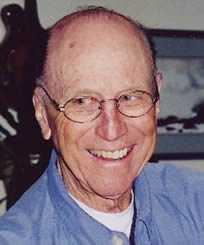

|

|
IN MEMORIAM
Virgil E. Schrock
Professor of Nuclear Engineering, Emeritus
UC Berkeley
1926 – 2007
An esteemed and distinguished faculty member of the Department of Nuclear Engineering at the University of California, Berkeley, Professor Virgil E. Schrock died on October 1, 2007 at home with his family in Santa Rosa, California. Schrock taught reactor thermal hydraulics, boiling heat transfer and two-phase flow, initially in the Department of Mechanical Engineering starting in 1948, and then in the Department of Nuclear Engineering from its creation in 1958 until his retirement in 1991. In this role he made fundamental advances in our understanding of boiling and two-phase flow.
Born on January 22, 1926 in San Diego, California, where he grew up and attended high school, Virgil Schrock studied mechanical engineering at the University of Wisconsin, Madison, completing his bachelor’s degree in 1946 and master’s degree in 1948. From spring of 1952 to fall of 1953 he interrupted his studies to serve in the U.S. Navy, serving as engineering officer on the USS O’Brien DD-725. He continued his service in the naval reserve, rising to the rank of commander.
Virgil Schrock’s scholarship included fundamental contributions to our understanding of heat transfer and fluid mechanics that are now embodied in existing nuclear power plants and in the designs of the passive safety systems of the new reactors now planned for construction in the U.S. Much of Schrock’s research and experimental work throughout his career focused on understanding boiling phenomena, but he also contributed in areas related to heat transfer in porous media, shock and pressure wave propagation in gases and various media, critical flow, fission product decay heat generation, two-phase flooding, pressurized thermal shock, and condensation. He was recognized as an authority of worldwide reputation in the area of two-phase flow and heat transfer in nuclear reactors.
Virgil Schrock’s service to the professions of nuclear and mechanical engineering was exceptional. He was elected as a fellow of both the American Society of Mechanical Engineers (ASME) and the American Nuclear Society, having chaired several national committees for these societies, and received numerous honors, including the ASME Heat Transfer Memorial Award, ASME Heat Transfer Division 50th Anniversary Award, and multiple best paper awards.
Virgil played a major role in launching the careers of his students and in mentoring junior colleagues. He was an excellent teacher, known particularly for the amount of difficult material he was able to convey with clarity, and for his appreciation of student difficulties. His renown for experimental research in classical thermal hydraulics brought graduate students from around the world to study under his mentorship. Maintaining the highest standards of academic research, Professor Schrock garnered respect from his students, who value the education and character-building lessons acquired in his Etcheverry Hall laboratory. By firmly grounding his students in the fundamental physics processes and demanding quality in research, Professor Schrock prepared his students to make significant contributions to the technical community. They pass his knowledge to future generations through careers as university professors, reactor designers and national laboratory senior researchers.
Virgil Schrock is survived by his loving wife of 61 years, Virginia, and his two children, Douglas Schrock and his wife Pamela, and Nancy “Scout” Wilkins and his son-in-law “Wil” Wilkins; four grandsons, Alexander and Sam Schrock and Andrew and Matt Wilkins; a granddaughter Joslyn; and his brother Don Schrock. Another brother, Ralph, died earlier.
Virgil and Virginia traveled widely through his work, living two separate years in Italy, and shorter lengths of time in Japan and China.
Virgil Schrock was very active all his life. As a young man, he assisted with his son’s Boy Scout troop when they backpacked throughout the Sierra and climbed Mt. Whitney numerous times. He loved to hike, enjoyed the local hiking club as well as daily walks around Oakmont, and climbed Hood Mountain in his last year with his family. He ran cross-country in college; records show that in his age group, he holds all-time sixth place in the annual Kenwood 3K, and in his sixties he placed highly in the San Francisco Bay to Breakers race. He loved growing things; he always had a huge, prolific garden at the family home in Orinda, and after moving to Oakmont in 2003, he enjoyed gardening at his son’s home with his grandsons. After taking up the hobby in the 1970s, he leaves a veritable forest of beautiful bonsai trees. He was also an excellent carpenter, and passed his skills on to his children, who both enjoy building. Tennis, however, was his consuming passion. He was an avid and competitive tennis player to the last.
A loyal and conscientious member of the Department of Nuclear Engineering, who contributed much to its early development, Professor Schrock will be sorely missed by his colleagues.
Lawrence Grossman
Per F. Peterson
Karen Vierow